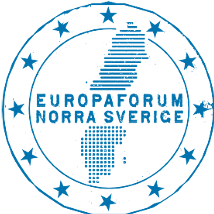Europaforum Northern Sweden (EFNS) is a network of politicians on local and regional level from Norrbotten, Västerbotten, Jämtland Härjedalen och Västernorrland. EFNS is a knowledge arena to analyse EU policies and discuss how they affect Northern Sweden. EFNS monitors European issues to influence EU legislation, EU strategies and action programmes, as well as the EU Budget. The objective of EFNS is to safeguard the interests of northern Sweden in EU policies with communication aimed towards both the European institutions and the national level.
Northern Sweden welcomes the European Commission engagement for regional transition
Europaforum Northern Sweden welcomes the European Commission efforts within the framework of the Green Deal to tackle global climate challenges through international commitments and increased investments for green transitions throughout Europe. The EU Climate Law with goals of reaching net zero emissions by 2050 requires high ambitions within all policy areas and in every European region with different preconditions to contribute to lowering carbon emissions, promoting sustainable development as well as creating more jobs and growth.
The sparsely populated areas of northern Sweden have territorial conditions that makes the regions particularly vulnerable, such as long distances, harsh arctic climate, sparse and aging population, lack of critical mass, as well as small and often raw materials-based economies that are highly sensitive to market fluctuations. At the same time, the OECD concludes that north Sweden contribute considerably to Swedish and European growth, and has opportunities to unlock even greater potential if conditions are improved for innovations, transport- and digital infrastructure, more cross-border cooperation and more regionally adapted strategies and tailormade support to provide companies with skilled labour. North Sweden has potential of playing a key role for EU’s green transition given the right conditions.
North Sweden safeguards a strong Cohesion Policy
The EU Cohesion Policy has created significant added value in north Sweden over time and is one of the most powerful investment tools that the EU and the regions have today to achieve structural change. Concurrently the Just Transition Fund (JTF) can, with the right territorial approach and being place-based as well as with more national resources, add to the ongoing transitional processes within the current support structures in a favourable way. It is also natural that the JTF joins the framework of Cohesion Policy, as the goals of Cohesion Policy coincide with the ambitions of the Green Deal to a large extent.
A transition to net zero emissions by 2050 will require a complete transformation of the society. This means that the need for ambitious investments are and will remain significant in for example, more modern and sustainable infrastructures, innovations, applied sciences and access to test environments. That is why it is important that the JTF complements other efforts that are carried out through structural funds.
However, north Sweden fear that the effects of the structural funds will risk diminishing if the transfer mechanism to JTF drains the European Regional Development Fund (ERDF) and the European Social Fund Plus (ESF+). The JTF also requires 60 percent co-financing in addition to the funding that is transferred permanently from the structural funds, which risk to hamper opportunities for stakeholders at the local and regional level to conduct regional development during the upcoming programming period.
- JTF can be a significant and complementing tool to Cohesion Policy. The establishment of a new fund cannot at be done at the expense of the measures within Cohesion Policy, but requires national cofinancing separate from the budget of ERUF and ESF+-. Ambitious policies require an ambitious budget. !
- The structural fund’s operational programmes cannot be delayed due to the establishment of JTF.
North Sweden underlines the importance of regional influence for effective implementation
The aim of JTF to mitigate the regional consequences of the Green Deal will be made possible through strong regional ownership over the JTF’s implementation. At the regional level of government there are great knowhow of the conditions for businesses, as well as experience of strategic innovation leadership and regional development.
The existing strategies for Smart Specialisation (S3) are appropriate point of departures for shaping and implementing the JTF. The strategies give both an analytical basis but also constitutes a strategic coordination of local, regional, national and European efforts for regional sustainable development that is characterized both by strategies aimed at diversification of the regional economies but also of a sustainable transition.
For continued development and transition of the regions, investments are needed in both technical developments and provision of skilled labour to make the existing industries more sustainable, as well as transform the local businesses. Technical developments with high costs should not push-out investments needed for diversification of local businesses or the transformation of small and medium sized companies. The industries of north Sweden are surrounded by innovative ecosystems of research actors and SMEs that have great potential to increase their export of technology and services to the global market. Regional stakeholders have experience in leading and driving innovation clusters with both local and global networks, within for instance digitalisation and industrial automation.
- Regional knowledge and regional strategies should be the basis for the implementation of the JTF to ensure effective implementation with a place-based approach in close cooperation with the regional organisations responsible for regional development.
- The programming processes should be characterized of multilevel governance, transparency and collective action. Political representatives from local and regional level should have real influence over the prioritisation and shaping of the regional transition plans.
Adopted by Europaforum North Sweden on March 13, 2020
Glenn Nordlund (S)
Ordförande EFNS Region Västernorrland
Åsa Ågren Wikström (M)
Vice ordförande EFNS Region Västerbotten
Jonny Lundin (C)
Region Västernorrland
Jan Sahlén (S)
Kommunförbundet Västernorrland
Rickard Carstedt (S)
Region Västerbotten
Ann Åström (S)
Region Västerbotten
Nils-Olof Lindfors (C)
Region Norrbotten
Britta Flinkfeldt (S)
Norrbottens Kommuner
Anders Josefsson (M)
Norrbottens Kommuner
Elise Ryder Wikén (M)
Region Jämtland Härjedalen
Robert Uitto (S)
Region Jämtland Härjedalen
Thomas Andersson (C)
Region Jämtland Härjedalen
